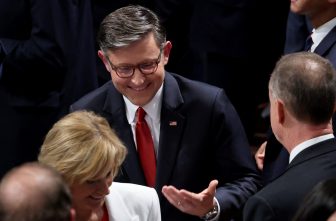One of the newer trends in the world of finance is socially responsible investing, and the Catholic Community Foundation incorporates it into its investment programs.
According to board member John Beuerlein, donors can be confident that none of their money goes to support companies whose products and/or services violate Church teaching.
“It’s a cornerstone of who we are,” said Beuerlein, chairman and chief investment officer for Marquette Asset Management, Inc., and a member of St. Patrick in Edina with his wife Cindy. “We’re excited about it. We really started digging into this deeply about a year and a half ago.”
Strong commitment

Beuerlein was part of CCF’s investment committee and told the nine other members that he wanted to form a socially responsible investing subcommittee. The idea was to use Catholic principles as a way of filtering out companies that acted contrary to Church teaching.
“I was expecting maybe only three or four people wanted to be on the subcommittee,” he said. “[But] every one of our committee members raised their hands and said, ‘I want to be involved with that.’
We believe that this is important. We believe this is an identifying mark of the foundation and we want to be involved. We have strong commitment from our investment committee, and certainly our board supports it as well.”
The foundation takes its cue from the U.S. Conference of Catholic Bishops, which released a document on the topic in 2003 entitled, “Socially Responsible Investment Guidelines.”
The idea is to exclude from investment portfolios those companies that offer either products or services that violate Catholic teaching. The bishops name six key areas: 1. Protecting human life; 2. promoting human dignity; 3. reducing arms production; 4. pursuing economic justice; 5. protecting the environment; and 6. encouraging corporate responsibility.
Beuerlein said the bishops are currently working on reviewing the list and may possibly update it.
“We’re going to take our cues from the bishops’ guidelines,” he said. “We as an organization are not trying to make a social statement. All we’re trying to do is invest people’s money in accordance with principles and guidelines that have been suggested by the bishops that are critical to the Catholic way of thinking.”
Monitoring companies
An important piece in doing so is working with Trinity Fiduciary Partners in Dallas. The company helps CCF identify companies that either are or could be in violation of Church teaching. That information then goes to CCF’s money managers.
“They have an objective way of scoring all the companies.”?Beuerlein said. “Are they really promoting some of these things that the bishops don’t want us to be involved with? Through their scoring system, they come back with a list of companies. Then, we as an investment committee look at those.”
Some people may worry that removing companies from the list could mean lower investment return. But, Beuerlein said, the opposite is true.
“You do get the push-back from people from time to time: ‘Doesn’t socially responsible investing automatically mean that my returns are going to be lower?’” he said. “That’s certainly a concern.
Actually, the research shows just the opposite. . . . Our research has shown us that you do not give up performance. In fact, you can enhance your performance and still accomplish your goals of being true to your faith.”
As the social and political landscape continues to change, CCF plans to keep monitoring both the issues and the list of companies.
“We meet on this specific topic twice a year,” he said. “We re-address it twice a year in a very structured manner. We just look at all our investments. We re-determine our list of acceptable investments, we re-determine our list of ones that we don’t want to be involved with. Then, if there are any changes, we alert the various money managers who are investing the money.”




